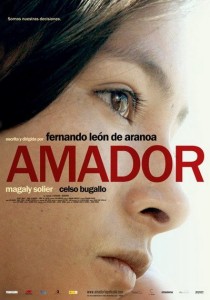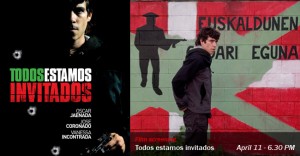Una noche con Sara. 55 años de ‘El último cuplé’
Homenaje a la actriz y cantante española Sara Montiel
Concierto en el Auditorio del Instituto Cervantes NY
4 de mayo 7:00 pm
Cincuenta y cinco años han pasado desde que Sara Montiel entonase con voz grave su famoso Fumando espero en la película El último cuplé. Para entonces, la actriz española ya se había convertido en una diva del cine mexicano, y más tarde de Hollywood, compartiendo protagonismo junto a actores de la talla de Gary Cooper, Burt Lancaster y Charles Bronson.
Ahora el Instituto Cervantes de Nueva York homenajea a esta figura de culto, quien compartirá con el público algunas de sus experiencias vitales y profesionales, además de cantar una selección de sus más famosos cuplés y boleros: Fumando espero; Tatuaje; La bien pagá; Bésame mucho y La violetera
ENTRADAS AGOTADAS
Organiza: Instituto Cervantes de Nueva York
Colabora: University of Cincinnati
Tribute to Sara Montiel. 55 Years After The Last Torch Song. Concert
Fifty-five years have gone by since Sara Montiel sang with her deep voice the famous Fumando espero (Smoking I Wait) in the film El Último Cuplé (The Last Torch Song). From that moment on, the Spanish actress became a diva of Mexican cinema, and later of Hollywood, starring with actors like Gary Cooper, Burt Lancaster and Charles Bronson, among others. ICNY pays tribute to this cult figure who will share with the audience some of her life and work experiences, as well as sing some of her famous torch songs and boleros.
SOLD OUT !
In Música en Amster Yard Series of concerts
SARA MONTIEL en la BIBLIOTECA ‘JORGE LUIS BORGES’
FILMS
- AMADORI, Luis César: Pecado de amor [Vídeo].- Los Ángeles (USA): Mexicinema Video Corp., 1986.- (VHS/NTSC): col.; 90 min. Nacionalidad: España, 1961. Intérpretes: Sara Montiel, Reginald Kernan, Mario Girotti, Rafael Alonso
- AMADORI, Luis César: La violetera [Vídeo].- España: Trevi-Vic-Perojo (Prod.), 1958. (VHS/PAL): color ; 90′. Intérpretes: Sara Montiel, Ana Mariscal, Raff Vallone
- ALCÁZAR, Alfonso: La bella Lola [Vídeo].- Italia: [s.n.], 1962.- (VHS/PAL); 100′ : color. Intérpretes: Sara Montiel, Antonio Cifariello, Frank Villard, Germán Cobos
- BARDEM, Juan Antonio: Varietés [Vídeo].- España: Video Diversión (Dist.), 1971. – (VHS/PAL) 90′ : color. Intérpretes: Sara Montiel, Vicente Parra, Chris Avram
- CAMUS, Mario: Esa mujer [Vídeo].- España: Club de Coleccionistas (Dist.), 1969.- (VHS/PAL) 90′: color. Intérpretes: Sara Montiel, Ivan Rassimov, Cándido Casado, Marcela Yurfa.
- DECOIN, Henri: Noches de Casablanca [Vídeo].- Barcelona: Dream Time Entertainment, S.A., 1997.- (VHS/PAL) (ca. 93 min.): son., col. – (Nuestro Cine) Producida en 1963 por Producciones Cinematográficas Balcázar, Finanziaria Cinemtográfica Italiana y Intercontinental Productions. Intérpretes : Sara Montiel, Maurice Ronet, Franco Fabrizzi, Leo Anchoriz, José Guardiola…[et al.] Nacionalidad : España-Italia-Francia
- DEMICHELI, Tulio: Carmen la de Ronda [Vídeo].- España: Mexcinema (dist.), 1959.- (VHS/NTSC); 90′ : color. Intérpretes: Sara Montiel, Jorge Mistral, Maurice Ronet, Amadeo Nazzari
- DEMICHELI, Tulio: La mujer perdida [Vídeo].- España: Video Diversión (Dist.), 1966.- (VHS/PAL); 90′ : color. Intérpretes: Sara Montiel, Massino Serato, Giancarlo del Duce, Antonio Ferrandis
- GIL, Rafael: Don Quijote de la Mancha [Vídeo] .- España: Cifesa (Prod.), 1947.- (VHS/PAL); 107′ (VHS/NTSC). Basada en: «Don Quijote de la Mancha», por Miguel de Cervantes. . Intérpretes: Rafael Rivelles, Juan Calvo, Fernando Rey,Sara Montiel
- GIL, Rafael: La reina del Chantecler [Vídeo] .- España : Club de Coleccionistas (Dist.), 1962. (VHS/PAL); 90′: color.Intérpretes: Sara Montiel, Alberto de Mendoza, Amelia de la Torre, Ana Mariscal
- GIL, Rafael: Samba [Vídeo]. – España: Vídeo diversión(Dist.), 1964 (VHS/PAL); 90′ : color. Intérpretes: Sara Montiel, Marc Michel, José Prada, Fosco Giachette
- LAZAGA, Pedro: Cinco almohadas para una noche [Vídeo] .- España: Video Diversión (Dist.), 1974.(VHS/PAL); 90′ : color Intérpretes: Sara Montiel, Craig Hill, Manuel Zarzo
- MARQUINA, Luis: El Capitán Veneno [DVD].- Madrid: Instituto Cervantes (dist.), [2007] (DVD/PAL) : B y N ; 87 min. Nacionalidad:España, 1950. Subtitulos: Inglés. Intérpretes: Sara Montiel, Fernando Fernán Gómez, Amparo Martí, Julia Caba Alba, José Isber , Trini Montero , Manolo Morán , Juan Vázquez
- MARQUINA, Luis:Tuset street [Vídeo].- España: Video Diversión (Dist.), 1968. (VHS/PAL); 90′ : color. Intérpretes: Sara Montiel, Patrick Bauchau, Teresa Gimpera, Emma Beltrán
- MORAYTA, Miguel: Ella, Lucifer y yo.- Northridge, CA: Laguna Films, 2000.- (VHS/NTSC): blanco & negro ; 90 min. Nacionalidad: México, 1952. Intérpretes: Sara Montiel, Abel Salazar, Carlos López Moctezuma, Luis Aragón, Trío Calaveras.
- ORDUÑA, Juan: Pequeñeces [Vídeo].- Valladolid: Divisa Ediciones, 1997. (VHS/PAL) (ca. 120 min.) : son., bl. y n. — (Clásico español) Producida en 1950 por Cifesa. Intérpretes : Aurora Bautista, Jorge Mistral, Lina Yegros, Carlos Larrañaga, Sara Montiel…[et al.]Nacionalidad: España.
- ORDUÑA, Juan: El último cuplé [Vídeo] .- España: Video COlección, 1967. (VHS/NTSC) : col. ; 108 min. Nacionalidad: España, 1967. Intérpretes: Sara Montiel, Armando Calvo, Enrique Vera, Julita Martínez.
- ORDUÑA, Juan: El último cuplé [Vídeo].- España: Video Colección (Dist.), 1987 (VHS/PAL) ; 108′ : color. Intérpretes: Sara Montiel, Armando Calvo, Enrique Vera, Julita Martínez. Produccíon: España, 1957.
- ORTEGA, Juan J.: Piel canela [Vídeo].- Valladolid: Vellavisión, 1997. (VHS/PAL) (ca. 90 min.): son., bl. y n. – (Sara Montiel en México ) México: Cía. Cinematográfica Mexicana, 1953. – Música de Gonzalo Curiel. Intérpretes : Sara Montiel, Manolo Fábregas, Ramón Gay, Felipe de Alba, Pedro Vargas…[et al.] Nacionalidad México
- RODRÍGUEZ, Roberto: ¡Yo soy gallo dondequiera! [Vídeo] .- Valladolid: Vellavisión, 1997. (VHS/PAL) (105 min.) : son., bl. y n. – (Sara Montiel en México).- México: Películas Rodríguez, 1952. – Música de Manuel Esperón. – Tit. de la cub. «Jimmy : (yo soy gallo donde quiera) Intérpretes: Sara Montiel, Joaquín Cordero, Fredy Fernández, Marco de Carlo, Julio Villarreal…[et al.] Nacionalidad México
- SÁENZ DE HEREDIA, José Luis: Bambú [Vídeo].- España: Video Mercury films (Dist.), 1945. (VHS/PAL) ; 90′ : B&W. Intérpretes: Luis Peña, Imperio Argentina,Fernando F. Gómez, Sara Montiel, Mary Lamer
- SÁENZ DE HEREDIA, José Luis: Mariona Rebull [Vídeo].- Producida por Ballesteros, S.A. — Valladolid: Divisa Ediciones, 1999. (VHS/PAL): b/n ; 112 min. – (Clásico Español) España, 1947. Según las novelas Mariona Rebull y El viudo Rius, de Ignacio Agustí» Intérpretes: José María Seoane, Blanca de Silos, Sara Montiel, Tomás Blanco, Alberto Romea
- SAÉNZ DE HEREDIA, José Luis: La mies es mucha [DVD].- Valladolid: Divisa, [2010] (102 min.); Producción: España, 1948. Extras: La india malagueña.- Filmografías Intérpretes: Fernando Fernán Gómez, Sara Montiel, Enrique Guitart, Rafael Romero Marchent, Antonio Almorós, Alberto Romea , Julia Caba Alba. España, 1948. Idiomas: español
- URUETA, Chano: «Porque ya no me quieres» [Vídeo].- Valladolid: Vellavisión, 1997. (VHS/PAL) (ca. 95 min.) : son., bl. y n. — (Sara Montiel en México).- México: Producciones Galindo Hermanos, 1954. – Canciones de Agustín Lara. – Tit. tomado directamente de los créditos de la película, sin embargo la mayoría de las obras que hemos consultado c. Intérpretes : Sara Montiel, Raúl Martínez, Agustín Lara, Wolf Rubinskis…[et al.] Nacionalidad México
- URUETA, Chano: Se solicitan modelos [DVD].- Santa Monica, CA: Xenon Pictures, 2006 (DVD/NTSC) : b. y n. ; (90 min.) Nacionalidad: México, 1954. Intérpretes: Sara Montiel, Raúl Martínez, Chula Prieto, Domingo Soler, Antonio Espino
- URUETA, Chano: Se solicitan modelos [Vídeo].- Valladolid: Vellavisión, 1997. (VHS/PAL) (ca. 90 min.) : son., bl. y n. – (Sara Montiel en México).- México: Producciones Galindo Hermanos, 1954. Intérpretes : Sara Montiel, Raúl Martínez, Chula Prieto, Domingo Soler, Antonio E. «Clavillazo»…[et al.] Nacionalidad México
- VAJDA, Ladislao: La dama de Beirut [Vídeo] / Vajda, Ladislao (dir.).- Italia: Producciones cinematográficas Balcázar (Prod.), 1965. (VHS/PAL) ; 88′ : color. Intérpretes: Sara Montiel, Giancarlo del Duca, Ferdinand Gravey, Alain Soury, José Calvo, Gemma Cuervo
- YO no creo en los hombres [Vídeo].- Madrid: Vellavision, 1997. (VHS/PAL) (90 min) :bl. y n.- (Sara Montiel en México) Intérpretes: Sara Montiel; Joaquín Cordero; Fredy Fernández. Producida en 1954
- ZACARÍAS, Miguel: El enamorado [Vídeo].- México: Miguel Zacarías (Prod.), 1951.(VHS/NTSC); 88′ : B&W. Intérpretes: Pedro Infante, Sara Montiel, Lalo Gonzáles, Irma Dorantes
- ZACARÍAS, Miguel: Necesito dinero [Vídeo].- México: Zacarías, S.A. (Prod.), 1951. (VHS/NTSC) ; 100′ : B&W. Intérpretes: Pedro Infante, Sara Montiel, Irma Dorantes, Gustave Rivero
ENTREVISTAS
- GÓMEZ-SANTOS, Marino: Mujeres solas: (Raquel Meller, Pastoria Imperio, Irene López Heredia, Carmen Sevilla, Sara Montiel, Lola Fores).- Barcelona: Pareja y Borrás, 1959.- […] Montiel, Sara / Entrevista
Memoria social e histórica. Una reflexión sobre el cine latinoamericano
Mesa redonda / Round table discussion
Instituto Cervantes – Auditorio. 19 de abril. 8:00 pm
Elias Jiménez, director. Casa Comal
Maite Rivera Carbonell, directora de cine
Sergio Ramírez, escritor
Josefina Cuxl Xuc, directora de cine
Leyzer Edinter Chiquin Chò, director de cine
Amalia Cordova, comisaria. Museum of Latin American Indian
 La historia tiende a menudo a ignorar la voz de los más desfavorecidos. En Latinoamerica no es una excepción por lo que, tomando como punto de partida la memoria social, varios directores de cine intentarán involucrar a esas voces marginadas con el fin de ampliar su comprensión histórica.
La historia tiende a menudo a ignorar la voz de los más desfavorecidos. En Latinoamerica no es una excepción por lo que, tomando como punto de partida la memoria social, varios directores de cine intentarán involucrar a esas voces marginadas con el fin de ampliar su comprensión histórica.
– Comunidades indígenas e ideología política
– Voces subalternas y discursos hegemónicos
– Visibilidad y representación de subgrupos en los medios de comunicación
– Percepción y memoria de la violencia en el marco de la historia oficial de un país
– Crímenes de guerra y recuperación desde perspectivas de género, étnicas y religiosas
– Comunidades imaginarias en economías post-colonizadas y su relación con el Estado.
– Diversidad cultural e intangibilidad en las películas, desde la antiguedad hasta nuestros días.
Traducción simultánea
Dentro de Cine Club
History and Social Memory, a Self-Reflexion From Latin American Cinema
History often ignores the voice of the disenfranchised. This is no exception in Latin America, yet through social memory as a point of departure, film directors are attempting to insert often-ignored voices to expand our understanding of history.
A panel of directors will discuss, among other topics:
– Indigenous communities and political ideology
– Subaltern voices and hegemonic discourses
– Visibility and representation of subgroups in the media
– Perception and memory of violence within the official history of a country
– Reconciling war crimes and restorations from ethnic, religious, and gender perspectives
– Interrogating imagined communities in (post)colonized economies and their relationship to the State
– Cultural diversity and intelligibility from the ancient to the modern as represented in film
Documentales de La Habana / Documentaries from Havana
Proyección de cine / Film screening
Instituto Cervantes – Auditorio. 18 de abril. 6:00 pm
 El Instituto Cervantes de Nueva York acogerá la premiere de dos documentales: 100 Sones y Ser un ser humano – Amor
El Instituto Cervantes de Nueva York acogerá la premiere de dos documentales: 100 Sones y Ser un ser humano – Amor
– 100 sones / Edesio Alejandro, director. Cuba, 2010. 81 min.
Lista con los cien sones más relevantes y auténticos, recopilados en un álbum que contiene las raíces del género. Esta pequeña expedición viaja hasta zonas lejanas de Cuba en búsqueda de la esencia del son, centrándose en los personajes principales que se encuentran detrás del ritmo. Un documental lleno de humor y auténtica música cubana.
Edesio Alejandro estará presente para un coloquio con el público asistente / Director, Edesio Alejandro, will be present for a Q&A
– Ser un ser humano – Amor / Varios directores. Cuba, 2011. 60 min. Uno de los seis episodios documentales que forman parte de la serie Ser un ser humano, hecha en ocho comunidades diversas en todo el mundo con la participación de jóvenes realizadores procedentes de diferentes países. Una celebración de la humanidad, basada en la sencilla premisa nacida de la conversación con una granjera de Kenya en 1986. Los seis sentimientos universales identificados constitutuyen el título de los seis capítulos: Perseverancia, Amor, Cultura, Fe, Miedo y Esperanza. La serie fue producida y coordinada por el International Film and TV School (EICTV) en San Antonio de los Baños (Cuba) con la participación de escuelas de cine de La India, Nueva Zelanda, Portugal, Jordania, España y Nueva York.
Rafael Rosal, director de la institución, hará la presentación / The director of the institution, Rafael Rosal, will introduce
Ambos documentales en español con subtítulos en inglés / In Spanish with English subtitles
Dentro de Cine Club
Instituto Cervantes New York will premiere two documentaries: The 100 Cuban ‘Sones’ and To be a Human Being – Love
– The 100 Cuban ‘Sones’: Cubans have selected a list of the 100 most relevant and authentic Cuban sones in order to merge them into the same album that contains the roots of this genre. This small expedition travels to far places of the island in search of the son’s essence, exalting the main characters behind the rhythm. This is a documentary full of humor and authentic Cuban music.
– To be a Human Being – Love: One episode of the six full-length documentaries that are part of To be a Human Being, a series made in eight diverse communities around the world by young filmmakers from film schools in seven different countries. It is a celebration of humanity, based on a simple premise that emerged from a conversation with a woman subsistence farmer in Kenya in 1986 – what we have in common is very big, and what is different between us is very interesting. The six universal human characteristics identified by the Kenyan farmer form the themes for the six Chapters of the series – Perseverance, Love, Culture, Faith, Fear and Hope. The series was produced and coordinated by the International Film and TV School (EICTV) in San Antonio de los Baños, Cuba, with other participating film schools from India, New Zealand, Portugal, Jordan, Spain and New York.
Amador
Proyección de cine / Film screening
Director Fernando León de Aranoa. Producción España. 2010. 110 min.
French Institute/Alliance Française. – Florence Gould Hall.- 22 East 60th Street (bet. Madison & Park)
14 de abril. 7:30 pm
Marcela es una mujer joven en apuros económicos que encuentra un trabajo para el verano cuidando de Amador, un señor mayor postrado en cama, en ausencia de su familia. Cree ver así sus problemas resueltos, pero a los pocos días Amador muere, dejando a Marcela en una difícil situación. Su fallecimiento la deja sin trabajo, y eso es algo que ella no se puede permitir… Enfrentada a un difícil dilema moral, Marcela va a demostrar que no siempre la muerte puede detener la vida.
La proyección de esta película forma parte del festival de cine europeo IV Disappearing Act, que tendrá lugar del 11 al 22 de abril.
Cine Club. Film series. Entrada gratuita.
En español con subtítulos en inglés / In Spanish with English subtitles
Marcela, a young woman with financial troubles, finds a summer job looking after Amador, a bed-ridden elderly man whose family is away. She thinks her problems are solved, but Amador dies shortly thereafter, putting Marcela in a predicament. His death leaves her jobless, something she can’t afford to let happen… Faced with a difficult moral dilemma, Marcela will prove that death can’t always stop life.
The screening takes part of the European Film Festival IV Disappearing Act, held at FIAF and IFC Center from Abril 11th to 22nd.
Organiza: EUNIC
Colaboradora: Instituto Cervantes de Nueva York
Todos estamos invitados
Proyección de cine / Film screening
Todos estamos invitados. Director Manuel Gutiérrez Aragón 2007. 95 min. España. Subt. Inglés
Tras la proyección de la película habrá un coloquio con su director, Manuel Gutiérrez Aragón
Organiza: Instituto Cervantes Nueva York
Colabora: Ministerio de Educación, Cultura y Deporte de España. Secretaría de Estado de Cultura


